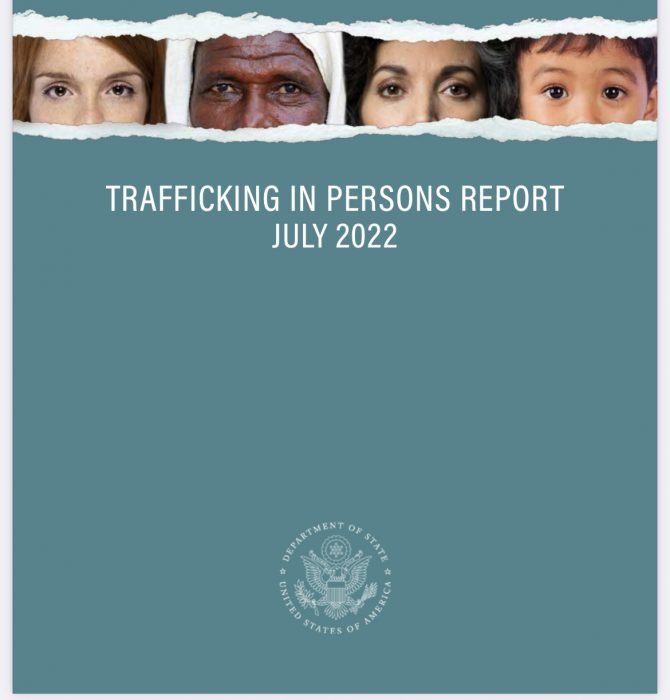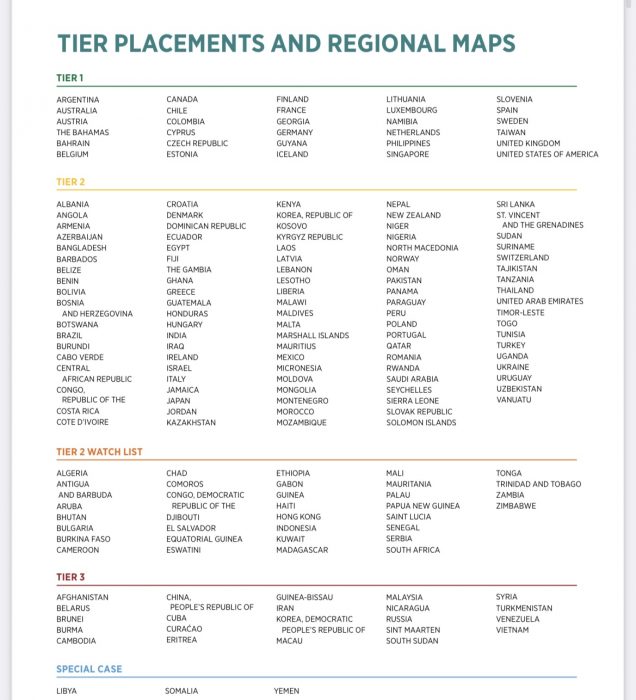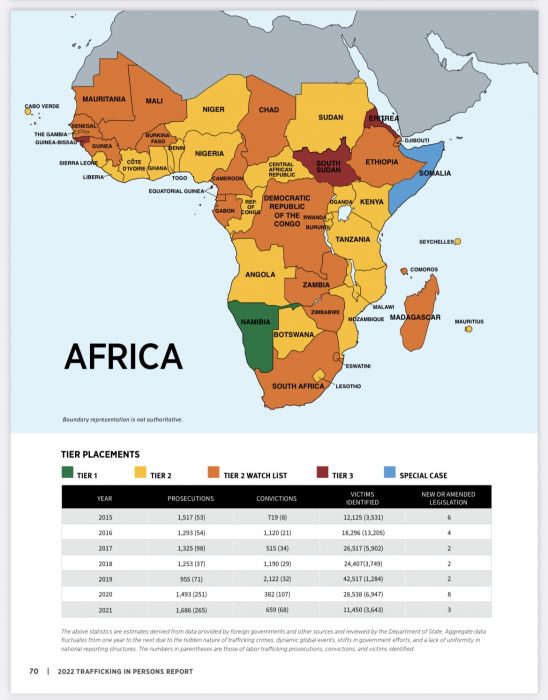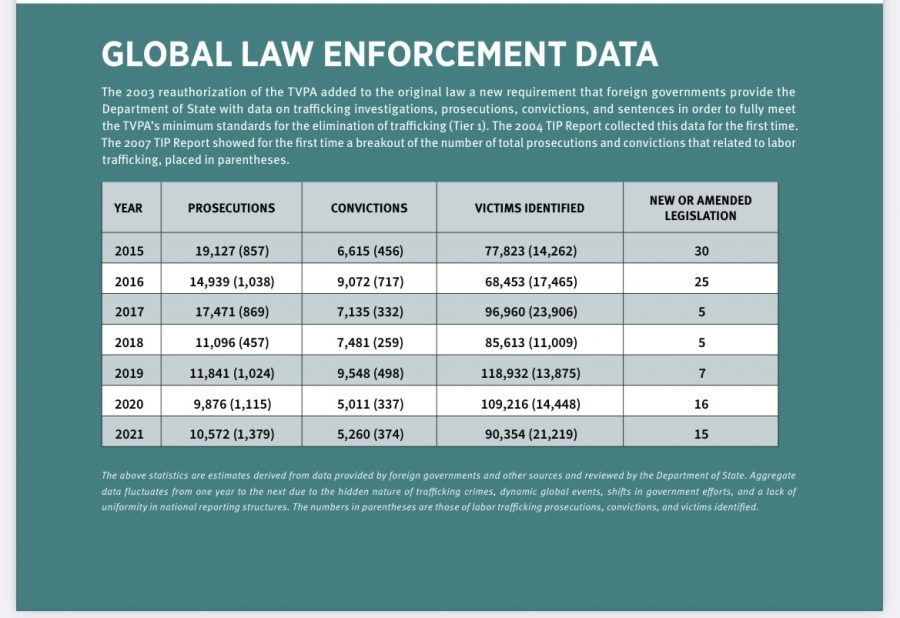July 20, 2022- WASHINGTON, D.C. The United State Department of State has released its 2022 Trafficking in Persons Report which ranks countries based on their respective government’s response to human trafficking in the preceding year (April 2021 to March 2022). Nigeria remains a Tier 2 Country (second to highest ranking, with Namibia being the only African country ranking Tier 1).
Brief Summary:
According to the Report’s Executive Summary on Nigeria: “The government demonstrated overall increasing efforts compared to the previous reporting period, considering the impact of the COVID-19 pandemic on its anti-trafficking capacity; therefore Nigeria remained on Tier 2. These efforts included investigating more traffickers, including two members of the Civilian Joint Task Force (CJTF) involved in alleged sex trafficking; investigating officials allegedly complicit in trafficking crimes; identifying and providing more services to victims; and developing and implementing a rapid assessment form to identify trafficking victims. However, the government did not meet the minimum standards in several key areas. The government has not prosecuted any members of the CJTF for prior child soldier recruitment or use, potential sex trafficking in government-run IDP camps remained a concern, and officials removed fewer children from conditions of forced labor. Further, corruption remained a significant concern in the judiciary as well as immigration services, and the Ministry of Defense did not finalize its handover protocol to refer child soldiers to care for the seventh consecutive year.”
Detailed Summary:
The Report’s prioritized recommendations for Nigeria include:
- Hold complicit officials as well as individuals affiliated with the government—including security officials and CJTF members—criminally accountable for trafficking offenses, including for the sex trafficking of IDPs and past unlawful recruitment and use of child soldiers.
- Enhance coordination between National Agency for the Prohibition of Trafficking in Persons (NAPTIP) and Nigeria Police Force (NPF) on law enforcement efforts—including investigating illicit centers exploiting women in forced surrogacy—and prosecute suspects while respecting the rights of the accused.
- Finalize the draft protocol to refer children identified in armed conflict to civilian authorities, screen for trafficking among those detained, and provide appropriate care for all those identified as victims.
- Strengthen efforts to identify trafficking victims among vulnerable groups, such as children in religious schools, IDPs, returning migrants, and children in domestic service.
- Increase public awareness programming to educate more of the population on human trafficking indicators.
- Expand shelter capacity for identified victims in coordination with other government entities, civil society, NGOs, international organizations, and the private sector.
- Increase efforts to investigate, prosecute, and convict traffickers—including labor traffickers and those who force children to beg—and impose sufficiently stringent sentences involving imprisonment.
- Work with CJTF and the UN to fully implement the child soldier action plan and confirm all children have been removed from the CJTF’s ranks.
- Facilitate training for local, state, and federal judges on the 2015 law, specifically the provision prohibiting the issuance of fines in lieu of imprisonment in collaboration with international partners.
Other highlights from the Report:
- Nigeria’s efforts in connection with the Prosecution of cases was described as “maintained.” Corruption and official complicity in trafficking crimes were described as “significant concerns” which potentially served to inhibit law enforcement during the reporting year.
- More specifically, during the Reporting Period, the Nigerian government “initiated investigations into 852 cases, including 323 sex trafficking cases, 168 labor trafficking cases, and 361 unspecified cases. The government continued investigating 663 cases initiated in previous reporting periods, including 416 sex trafficking cases and 247 labor trafficking cases. This compared with initiating investigations into 381 cases and continuing investigations into 452 cases during the previous reporting period. The government initiated prosecutions in 30 cases, including 14 for sex trafficking, three for labor trafficking, and 13 unspecified cases. The government continued prosecution from previous reporting periods of an additional 64 cases, for a total of 94 prosecuted during the reporting period, and 30 of the cases were prosecuted under the 2015 Trafficking Law. This compared with prosecuting 49 suspects the previous reporting period. The government secured 13 convictions, seven for sex trafficking and six unspecified, compared with convicting 36 individuals the previous reporting period. Eleven of this year’s convictions were secured under the 2015 Trafficking Law and two under the 2015 Violence Against Persons Prohibition Act.
- With regard to the Protection of victims of trafficking, the report notes that efforts, albeit “insufficient,” had increased from the prior reporting period (2020).
- More specifically, the Nigerian government “identified 935 trafficking victims, including 521 sex trafficking victims, 129 labor trafficking victims, and 285 victims of unspecified exploitation, compared with identifying 499 victims and 812 potential victims the previous reporting period. Of the 521 sex trafficking victims, 158 were children, all girls, and the rest were women. Of the 129 labor trafficking victims, 26 were men, 37 were women, 11 were boys, and 55 were girls. The victims of unspecified exploitation included four men, 29 women, 71 boys, and 181 girls. NGOs identified an additional 52 trafficking victims, of which 43 were sex trafficking victims, including eight girls; six labor trafficking victims, including four girls; and three victims of unspecified exploitation, all children. The government and government-supported NGOs provided services to 987 individuals, including 564 sex trafficking victims, including 172 children; 135 labor trafficking victims, including 70 children; and 288 victims of unspecified exploitation, including 255 children. This compared with providing services to 434 victims and 321 potential victims during the previous reporting period.
- It is noteworthy that although the Victims Trust Fund remained available to victims, no budgetary funds were allocated to it. No details were provided on victim restitution, which was reported to have been provided to some victims.
- Regarding Prevention, the report notes that efforts here were “maintained” over the reporting report.
- More specifically, it noted that although NAPTIP continued to lead the federal government’s efforts to combat trafficking, it was supported by other ministries, including Defense, Justice, Foreign Affairs, Labor and Productivity, and Women Affairs and Social Development.
- The fact that NAPTIP’s leadership changed multiple times over the reporting period was noted, as well as the fact that the agency’s efficacy improved post the appointment of its current Director General.
- Its limited resources to conduct “proactive” anti-trafficking efforts across the country was also noted, particularly in rural areas.
- The report noted that NAPTIP finalized, and the Federal Executive Council approved, the National Action Plan for 2022-2026, which Pathfinders served as a consultant for. NAPTIP also inaugurated and trained four new state task forces.
- The report notes that Nigerian trafficking victims—who are most often exploited by Nigerian traffickers—were identified in Africa, Europe, and the Middle East during the reporting period. Although contrary to NAPTIP’s 2021 data, the report includes Edo as one of the top states of origin for trafficking victims, with Delta, Kano, Abia, Ebonyi, Imo, and Kogi following behind. Many continue to be victimised in sex slavery and in forms of forced labour. It notes the continued activity of Boko Haram in recruiting child soldiers and the victimization by mixed migration networks of many involved in unsafe migration through Niger and Libya. West and Central African countries—including Cabo Verde, Cote d’Ivoire, Mali, and Senegal— as well as to South Africa- were also noted as trafficking destinations from Nigeria.
- The report continues to fail to highlight and/or take into consideration what is often the complaisance and complicity of many developed countries in the proliferation of human trafficking around the developing world (their involvement in wars, demand for prostituted African bodies, demand for fast fashion, cheap labour, racism, etc.).
To read the full report on Nigeria, visit: https://www.state.gov/reports/2022-trafficking-in-persons-report/nigeria/.






Recent Comments